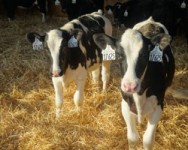Event Details
Date
August 7, 2017
Time
11:00 am - 3:00 pm
Cost
This event is free.
Host
South Central New York Dairy and Field CropsCathy Wallace
585-343-3040 x138
email Cathy Wallace
EVENT HAS PASSED
Pre-EFD Dairy Calf Intensively Managed Housing/Feeding System - "Drive Yourself Tour" and Program
August 7, 2017
What you will see:
This year's Empire Farm Days is slated for August 8 through 10 at the Rodman Lott & Son Farms near Seneca Falls, NY. The 2017 Dairy Profit Seminars will include:
- Robotics and Maximizing Milk Per Box: Grouping and Feeding;
- Transitioning to Automatic Milking Systems: What Have We Learned?; and
- Is your farm a Member of the 7 Pound Club? Leading dairy producers into the next frontier of maximizing pounds of components produced, while maintaining profitability.
Schedule Tour A
Starts at True Farm
11:10 a.m. Why group housed/group fed calves? - Jeff and Corwin Holtz, Holtz Nelson Consulting
11:25 a.m. Tour calf barn and facilitated discussion
11:45 a.m. Closing remarks
11:50 a.m. Depart for Synergy Farm
12:15 p.m. Lunch and visit sponsors at Synergy Farm
1:00 p.m. Guest Speaker - Dr. Fernando Soberon, Shur Gain "Bringing it all together for calf success"
1:45 p.m. Welcome - John Rudgers
1:55 p.m. Why individual housed/individual fed calves in a controlled environment barn?
2:05 p.m. Overview of the Cornell neutral ventilation system/results - Curt Gooch, Cornell PRO-DAIRY
2:15 p.m. Tour neutral ventilated calf barn and facilitated discussion
3:00 p.m. Closing remarks
Schedule Tour BStarts at Synergy Farm
11:10 a.m. Why individual housed/individual fed calves in a controlled environment barn?
11:25 a.m. Overview of the Cornell neutral ventilation system/results - Curt Gooch, Cornell PRO-DAIRY
11:40 a.m. Tour neutral ventilated calf barn and facilitated discussion
12:15 p.m. Lunch
1:00 p.m. Guest Speaker - Dr. Fernando Soberon, Shur Gain "Bringing it all together for calf success"
1:45 p.m. Depart for True Farm
2:05 p.m. Welcome - Jeff True
2:15 p.m. Why group housed/group fed calves? - Jeff and Corwin Holtz, Holtz Nelson Consulting
2:30 p.m. Tour calf barn and facilitated discussion
3:00 p.m. Closing remarks






